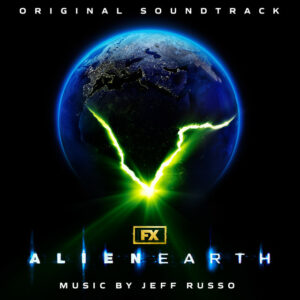
Alien: Earth (Jeff Russo)
What is it?
Alien: Earth is the new, much anticipated Alien series by showrunner Noah Hawley (Fargo, Legion) – the first-ever TV series in the franchise, produced for FX/Disney+ – and builds on a simple premise: Two years before the events of the first film, a Weyland-Yutani spaceship crashlands on earth, with some of its biological specimens (including eggs, facehuggers and xenomorphs) on the loose, while various corporations vye for ownership. Some musings on artificial intelligence are also thrown in.
The refreshing thing about the series is the reappearance of auteur traits (which were disappointingly absent in last year’s Alien: Romulus) – a feature that has defined all Alien films, and sets it apart from other genre franchises. Hawley brings his reliance on close-ups, saturated colours, slow dissolves and characters speaking calmly and stoner-like into the mix, recurring features of his idiosyncratic (and slightly David Lynch-inspired) Marvel series Legion.
On the other hand, there are some peculiar elements that make it less than the pre-Romulus films, like an inconsistent tone or variations of the (on paper interesting) Peter Pan myth. There’s also a disruption of the single-focus intensity of the chase – something that naturally happens when you cross-cut between multiple storylines in a series format.
The music is written by regular Hawley collaborator Jeff Russo (b. 1969), who is no stranger to science fiction via his work on various Star Trek series, the moody mystery show The Returned or the engrossing alternate history show For All Mankind.
How is it?
Just as the previous films have subscribed to unique auteur stamps (at least prior to Romulus), so too have the scores had their unique sonic identities – Goldsmith, Horner, Goldenthal, Frizzell, even the work of Streitenfeld and Kurzel for the prequels. It’s difficult to argue that Russo’s work has a similar, striking identity. It’s wholesome and well-produced, but nothing that really sets it apart.
There are most definitely references to the existing Alien scores, as one would expect – Goldsmith’s echoplex trumpets make frequent appearances in the first couple of episodes (tracks like «Crew Status» or «To Be an Animal», for example), there’s even a “re-mixed”, rhythmical version in a chase sequence («Evolution»). Also, Goldsmith’s open, more overt science fiction style (which Russo also explored in the Star Trek shows) is apparent in a cue like «Siblings» – a highlight of the album. Meanwhile, Horner’s eerie string pluckings, or the anvil from the sequel are referenced in cues like «Alien – Earth Pt. 2», «Xenomorph» and «Crew Status», for example.
At 90 minutes – the duration of an average feature film – the album is at least half an hour too long, an issue that plagues many soundtracks these days, but becomes particularly troublesome when there is so much dissonant suspense music. The score is at its best when it either paints dark and romantic sentiments in broad strokes (such as the first three tracks), or oddball elements that bring it closer to its own identity – like the quintet tracks, the staccato chorus in «Hermit Enters» and «Voices» or the rock guitar strummings of «Procession». It makes one think what the score would have sounded like in the hands of someone like Cristobal Tapia de Veer. (By the way, much has been said about Hawley’s decision to end each episode with a contemporary rock song, but that’s actually quite original).
Where I think Russo succeeds is his reliance on well-written, traditional orchestral writing, even when it turns weird and abstract. There are few instances of the earshattering sound design approach that is all the rave these days, and which also plagued a large portion of Benjamin Wallfisch’s Alien: Romulus. Where it perhaps falters a bit, is the lack of a strong musical voice. Perfectly effective in the series, but not that memorable. It settles somewhere inbetween.


Leave a Reply